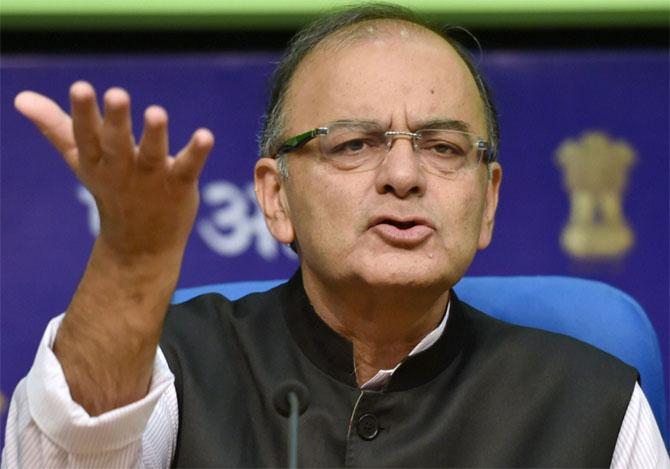DeMo led to more tax collection, higher growth: Jaitley
August 30, 2018 19:31

Union Finance Minister Arun Jaitley today said the demonetisation of Rs 500/1,000 notes led to formalisation of economy, more tax collection and higher growth.
His statement comes a day after Reserve Bank of India data revealed that almost all the scrapped notes were returned to banks.
He said the Reserve Bank has twice released its reports stating that the demonetised notes Rs 500 and Rs 1,000 have been substantially deposited in the banks.
"A widely stated comment has been that just because most of the currency came back into the banks, the object of demonetisation has not succeeded.
"Was the invalidation of the non-deposited currency the only object of demonetisation? Certainly not," Jaitley said in a blog.
The larger purpose of demonetisation was to move India from a tax non-compliant society to a tax-compliant society, he said adding this necessarily involved formalisation of the economy and a blow to the black money.
"This is the positive impact of demonetisation. More formalisation of economy, more money in the system, higher tax revenue, higher expenditure, higher growth after the first two quarters," the finance minister said.
Jaitley said the growth of Income Tax collections in the pre-demonetisation two years was 6.6 per cent and 9 per cent.
Post-demonetisation, the collections increased 15 per cent and 18 per cent in the next two years.
"The same trend is visible in the third year," he said.
In March 2014, the number of Income Tax (IT) returns filed was 3.8 crore.
In 2017-18, the number has grown to 6.86 crore.
In the last two years, when the impact of demonetisation and other steps are analysed, the IT returns have increased 19 per cent and 25 per cent, Jaitley noted.
On November 8, 2016, Prime Minister Narendra Modi announced the demonetisation of high-value currency notes.
Of the Rs 15.41 lakh crore worth Rs 500 and Rs 1,000 notes in circulation on November 8, 2016, notes worth Rs 15.31 lakh crore have been returned to the banks.
Meanwhile, Vice-President M Venkaiah Naidu said money hidden in 'bathrooms and bedrooms' have made their way back into the banking system due to the demonetisation exercise.
Referring to the RBI report that said 99.3 per cent of the junked Rs 500 and Rs 1,000 notes have returned to the banking system, Naidu said he wondered why people were worried over it.
He said he was really happy that almost the entire money has come back into the banking system.
"The money which was there in 'bathrooms and bedrooms' has come back to banks. My simple point is money has come back. How much out of it is black or white, it is the duty of RBI and Income Tax and they will verify," Naidu said.
"If people want to convert black into white...that also is allowed by Parliament..pay the tax..add to the revenue so that the money can be spent for the people," he said.
Some people had criticised the Jan Dhan scheme, questioning its need when people have no money.
"They realised the importance of Jan Dhan on November 8, 2016 (when demonetisation was announced), and started asking their drivers and peons..do you have a bank account?... that is how the money has come back to banks now. That is the secret. Those (suspicious) accounts have to be verified and confirmed," Naidu said. -- PTI





 © 2024 Rediff.com -
© 2024 Rediff.com -